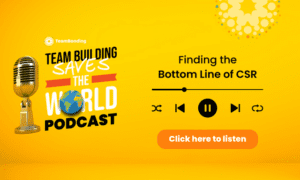How to Change Company Culture: The Role of Empathy in Cultural Transformation
Cultural transformation—the process of changing company culture to align with core vision, values, and goals—is a necessity for any successful organization. What many don’t realize however is that empathy is the lifeblood of cultural transformation. Empathy helps us understand the experiences of others, enabling positive change. A foundation in corporate social responsibility (CSR) builds an empathetic culture, fostering an inclusive, vibrant, and thriving workplace environment.
In our most recent episode of the Team Building Saves the World Podcast, we talk with renowned team building and cultural transformation expert Doug Manuel. We discuss the importance of empathy, collaboration, and authenticity in cultural transformation, as well as the role leaders play and the intersection of music and team building. Manuel noted how organizations can help bring people together and have a positive impact on the world through their culture, saying:
“I hold a strong belief that politicians don’t rule the world—companies do. And if we can bring people together in organizations and have people work together—not just in organizations, but between organizations—then I think we can make a positive difference and have a positive impact in the world.” – Doug Manuel
Let’s cover the importance and benefits of cultural transformation, how team building can be a catalyst for empathy and transformation, what a culture shift is, practical steps for cultural transformation, and breakdown the insights offered by Manuel.
Driving Cultural Transformation
To start, let’s take a close look at the idea of cultural transformation. At its core, cultural transformation is about aligning an organization’s culture with its core vision, values, and goals. Aligning these things can result in better outcomes for your organization and its employees.
However, cultural transformation goes deeper than that. It is also an important aspect of adapting to changing workplace dynamics. The workplace and its dynamic are forever changing, and cultural transformation can allow organizations to adapt to those changes, resulting in a more positive, thriving, and successful workplace. While cultural shifts have numerous positive benefits, you need to guide those shifts towards a more inclusive, and collaborative company culture. One of the key ways to do that is by focusing on and prioritizing empathy.
The role of empathy in the workplace should not be underestimated. Without a focus on empathy, cultivating inclusivity and collaboration can be a challenge. Empathy helps us better understand those around us, their struggles, and their experiences. It drives people toward inclusivity and collaboration, both of which have numerous benefits for an organization. For example, empathy can help team members understand each other. With better knowledge of each other’s strengths and weaknesses, teams can more effectively collaborate by playing to their advantage—resulting in a more effective and efficient team.
Fostering Empathetic Cultures Through Team Building
With the importance of empathy to cultural transformation clear, the question becomes: how do you foster empathetic cultures? Creating an empathetic culture can seem like a big undertaking, and many are intimidated by the idea. Thankfully, it is something anyone can do with the right knowledge and approach.
One of the best ways to foster empathetic culture is with team building. Team building can help your team members learn more about each other and get a more complete understanding of those around them. At the same time, it can also highlight the benefits that come along with empathy. To illustrate, let’s look at some of our team building events. Clean Water Connection, the Prosthetic Hand Project, and Wheels Around the World. These events all involve teams coming together to help those in hand, whether by providing water filters, assembling prosthetic hands, or sponsoring wheelchairs.
In doing so, teams get exposed to empathy in numerous ways. First, they learn about their fellow team members, their experiences, and their feelings. Beyond that though, they also learn more about those in need and develop a deeper understanding of what those people are going through. This all helps develop and prioritize empathy in your teams and company culture.
It’s also key to keep in mind what empathy really is. During our conversation, Manuel offered an interesting insight about empathy, what it really is, and howimportant it is for all people. He said:
“True empathy is really understanding where the other person is at and what they are actually feeling. So once we can do that, then what do we do with empathy? And actually all people want, whether it be clients or whether it be colleagues, they just want to be heard.”
Team building isn’t the only option though. It’s also important to focus on things like deep listening and working empathy into your organization’s daily operations and procedures.
What is a Culture Shift?
Taking a step back, let’s look more at what is a culture shift. A culture shift can be defined as a change in the vision, values, norms, practices, and more of an organization. Cultural shifts are inevitable to an extent, and they can have a big impact on organizational dynamics and employee engagement.
Culture shifts can help your organization create a better corporate culture, creating a healthier and more positive workplace environment that is more productive, creative, and efficient. However, culture shifts can also be negative and create a more toxic culture that has the opposite effects. This is why leadership has an incredibly important role in any cultural transformation; it can help guide and drive cultural shifts in a positive direction by fostering empathy and leading by example.
This also ties in with the importance of CSR in cultural shifts. As Manuel’s quote in the intro highlights, organizations have the power and responsibility to have a positive impact on their employees and the world around them. This starts with leaders, as they can guide cultural shifts to a more positive and impactful outcome. Again though, it is key to emphasize empathy. Leaders need to be empathetic, considering contexts such as their employees, the environment, the local area, and more.
Practical Steps for Transforming Company Culture
Now, let’s focus on some practical steps for transforming company culture. With these tips and strategies, it’s possible to help your organization transform into a more positive, empathetic, and collaborative culture.
One of the simplest and most effective strategies is to encourage open communication and deep listening. Simply allowing people to speak their minds and taking the effort to really listen to and understand what they’re saying can have a huge impact. So let people speak. Make sure everyone gets heard during meetings. When someone comes to you with a problem or issue, listen to them and take it to heart. Showing that you value open communication and listening deeply to those around you will impact the entire workforce, creating a more open and empathetic environment.
This is something that Manuel touched on during our conversation. He noted that some of the best strategies for cultural transformation are internal, such as deep listening or playing music, saying:
“It’s not about always finding external strategies. It’s about deep, deep, deep listening. And as human beings, we have that capacity. It’s about being felt rather than thought. And that’s where rhythm and the djembe comes back into play.”
It’s also important to discuss sustaining a cultural transformation. You want your changes to last, which can be difficult. A good way around that is by working those changes directly into your organization’s values and procedures. If things like empathy and communication are core values that people have to utilize every day, those changes are much more likely to be permanent.
Leaders also play a key role in how to change company culture. Leaders with empathy and good communication can help set the standard that employees follow. In doing so, you can establish new norms and help your cultural transformation last.
Team Building as a Catalyst for Cultural Transformation
Before finishing up, let’s quickly discuss the role team building plays as a catalyst for cultural change and as part of an organizational transformation strategy. Team building can be a key component of change, bringing teams together, improving communication skills, and promoting empathy.
One example of this is the company Squarespace. Though the company has done well, it grew rapidly from 30 employees at its founding to over 1000 today. To deal with this, the company had to undergo a cultural transformation to ensure their employees were happy and satisfied. They utilized a number of the tools and strategies detailed in this article to transform their culture, and the end result was incredibly positive. According to Comparably, they are rated A+ in company culture and are in the top 5% of companies for overall company culture.
Team Building is an incredibly valuable tool when it comes to cultural transformation. It can help develop empathy, encourage communication, improve collaboration, and more. So be sure to utilize team building as a resource, whether you choose one of our many events or create your own team building exercises.
Transform Your Company Culture with TeamBonding
Cultural transformation is an inevitability for businesses, but it can be utilized to create more positive, healthy, and efficient company cultures. By promoting and developing empathy, you can guide a cultural shift toward a positive outcome that helps your organization and its employees.
To learn more about empathy building and team bonding, take a look at some of our CSR team building programs and Doug Manuel’s keynotes for your team. Also, be sure to check out the Team Building Saves the World Podcast for more insightful discussions about team building, company culture, and the workplace. And if you’re ready to take your team to the next level, get in touch with us today!
Get more insights in our newsletter:
* every subscription supports charity!


 Unlock exclusive resources for better teams. Every subscription supports charity!
Unlock exclusive resources for better teams. Every subscription supports charity!
Create Your Free Account
Get exclusive access to new programs from the TeamBonding Lab, save your favorite ideas, and track your upcoming events.
Already have an account? Login








